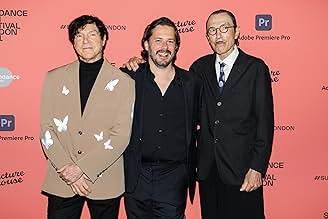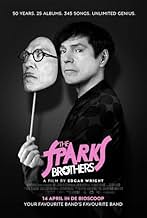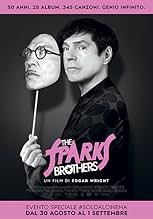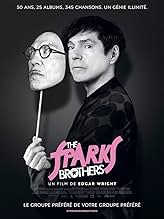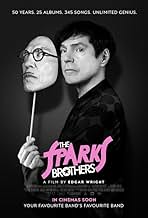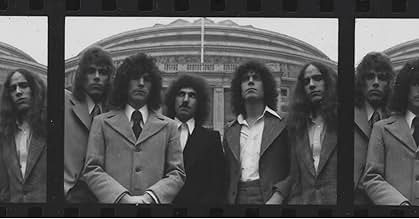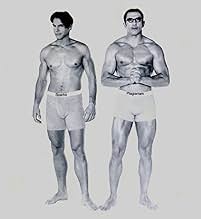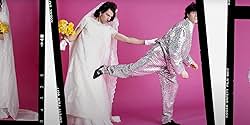IMDb-BEWERTUNG
7,8/10
6387
IHRE BEWERTUNG
Eine musikalische Odyssee durch fünf verrückte und wunderbare Jahrzehnte mit Ron und Russell Mael, die das inspirierende Vermächtnis von Sparks feiern.Eine musikalische Odyssee durch fünf verrückte und wunderbare Jahrzehnte mit Ron und Russell Mael, die das inspirierende Vermächtnis von Sparks feiern.Eine musikalische Odyssee durch fünf verrückte und wunderbare Jahrzehnte mit Ron und Russell Mael, die das inspirierende Vermächtnis von Sparks feiern.
- Auszeichnungen
- 5 Gewinne & 26 Nominierungen insgesamt
Sparks
- Themselves
- (Archivfilmmaterial)
Meyer Mael
- Self
- (Archivfilmmaterial)
The Beatles
- Themselves
- (Archivfilmmaterial)
The Who
- Themselves
- (Archivfilmmaterial)
The Kinks
- Themselves
- (Archivfilmmaterial)
Empfohlene Bewertungen
Ron and Russell Mael are Californian brothers who created the longtime eccentric band, Sparks. They have made 25 albums with differing loyal fans over the years. I have no idea who these guys are. This may as well be a mockumentary. With all the old footage, it's obvious that they are real. I just wish for one trans Atlantic hit that I can grab onto. They seem to be bigger in Britain. That probably explains it. It's part of the pop culture that I missed back in the day. They also seem to be big in L. A. and Germany for awhile. This is nostalgic by association. I didn't actually listen to them, but they influence so many others that means so much to me. Part of the issue may be their satirical sensibilities and that they're always changing their sound. It does allow for an interesting retrospective in that these guys are so unusual.
I'm not too familiar with the pop-rock duo band Sparks, but I'm a fan of Edgar Wright and this documentary has received strong reviews. As a result, I jumped at the chance to see a virtual advance screening of this exuberantly quirky, playfully irreverent, and ambitious documentary that serves as a comprehensive profile of Sparks, whose career has spanned five decades. The film runs at a lengthy 2 hours and 20 minutes, but Wright's deep affinity for the band is apparent in every single minute of the film. As a result, the film never feels too long-even for those who are not committed fans-but rather a well-researched, thoughtfully idiosyncratic ride that viewers are invited to hop along on. What's fascinating here is that even viewers with no understanding of Sparks can not only be sucked in after watching the first 20 minutes or so of the film, but will also remain fascinated throughout as the analysis of the band gets deeper and deeper. Wright also makes it abundantly clear how inspirational Sparks has been for many other (even more) prominent musicians in the rock and pop genres.
The film discusses the two members of Sparks, Ron and Russell Mael. Opening with a discussion of their early history and influences (which included sports and genre films,) context about how this duo has gained such a significant cult following and cultural prominence is clearly absorbed by the viewer. Edgar Wright films, particularly "Hot Fuzz" and "Baby Driver," are usually very well-edited due to Wright's stylistic editing style. While the editing process is much different in a documentary than a narrative film, Wright still edits the film to perfection. The juxtaposition between music videos, concert footage, interviews, and other relevant context pertaining to Sparks is fast yet incredibly impactful on the viewer throughout. This editing clearly contributes to the ebb and flow of the film, which Wright should be commended for. The unique combination of interviewees represented in the film (ranging from the Maels themselves to die-hard fans and many others) come together to make the film's craft feel even more holistic. My only main criticism of the film is that the second act is not as well-structured or interesting as the first act (which is more contextual) or the third act (which is more specifically/directly focused on Sparks' music.) Other than that key structural flaw, I found this documentary to be a uniquely informative viewing experience. 7.5/10.
The film discusses the two members of Sparks, Ron and Russell Mael. Opening with a discussion of their early history and influences (which included sports and genre films,) context about how this duo has gained such a significant cult following and cultural prominence is clearly absorbed by the viewer. Edgar Wright films, particularly "Hot Fuzz" and "Baby Driver," are usually very well-edited due to Wright's stylistic editing style. While the editing process is much different in a documentary than a narrative film, Wright still edits the film to perfection. The juxtaposition between music videos, concert footage, interviews, and other relevant context pertaining to Sparks is fast yet incredibly impactful on the viewer throughout. This editing clearly contributes to the ebb and flow of the film, which Wright should be commended for. The unique combination of interviewees represented in the film (ranging from the Maels themselves to die-hard fans and many others) come together to make the film's craft feel even more holistic. My only main criticism of the film is that the second act is not as well-structured or interesting as the first act (which is more contextual) or the third act (which is more specifically/directly focused on Sparks' music.) Other than that key structural flaw, I found this documentary to be a uniquely informative viewing experience. 7.5/10.
"How can a band be successful, underrated, hugely influential, and overlooked all at the same time?" Edgar Wright (director)
Although the cult art-pop band Sparks has been playing its idiosyncratic music for fifty years, you may never have heard about the two brothers or their music. Be prepared to remember them forever after seeing Edgar Wright's loving and comprehensive documentary covering their zany years of performance.
The two boys, Ron and Russ Mael, were born in California with the creative influence of the Beach Boys but a definite affinity for Brit bad boys like the Beatles and The Stones and touches of Queen. In fact, Ron and Russell Mael may have been a major influence on British synthpop.
Wright skillfully shows their emerging theatrics of Ron's culturally-sharp lyrics and Russell's stagey falsetto gyrations evocative of Mick and Freddie. They have their career careening from high on the charts to being absent from them, but never stopping the two from inventing themselves over and over again.
If you don't believe me, listen to persuasive talking heads who know what they're talking about, like Duran Duran, Weird Al Yankovic, Patton Oswalt, Sonic Youth, et al. However, just listen to their sometimes-inscrutable lyrics and watch Russell gyrate around the implacable Ron, and you will experience music in all its forms, wild and expressive.
As Ringo was alleged to say while watching Top of the Pops, "Marc Bolan is on the tele playing a song with Adolph Hitler" (Ron wore a Hitler-like stache much of the time). In the course of their half century, they went from glam-rock to orchestral art-pop to their take on Sgt Pepper and everything in between. It's exhausting just to try to catalogue their phases.
In Theaters.
Although the cult art-pop band Sparks has been playing its idiosyncratic music for fifty years, you may never have heard about the two brothers or their music. Be prepared to remember them forever after seeing Edgar Wright's loving and comprehensive documentary covering their zany years of performance.
The two boys, Ron and Russ Mael, were born in California with the creative influence of the Beach Boys but a definite affinity for Brit bad boys like the Beatles and The Stones and touches of Queen. In fact, Ron and Russell Mael may have been a major influence on British synthpop.
Wright skillfully shows their emerging theatrics of Ron's culturally-sharp lyrics and Russell's stagey falsetto gyrations evocative of Mick and Freddie. They have their career careening from high on the charts to being absent from them, but never stopping the two from inventing themselves over and over again.
If you don't believe me, listen to persuasive talking heads who know what they're talking about, like Duran Duran, Weird Al Yankovic, Patton Oswalt, Sonic Youth, et al. However, just listen to their sometimes-inscrutable lyrics and watch Russell gyrate around the implacable Ron, and you will experience music in all its forms, wild and expressive.
As Ringo was alleged to say while watching Top of the Pops, "Marc Bolan is on the tele playing a song with Adolph Hitler" (Ron wore a Hitler-like stache much of the time). In the course of their half century, they went from glam-rock to orchestral art-pop to their take on Sgt Pepper and everything in between. It's exhausting just to try to catalogue their phases.
In Theaters.
Greetings again from the darkness. Over the past 5 decades, the number of bands that have broken up is, well, almost all of them. For two brothers to write songs and perform together over that span, and still be at it in their 70's is remarkable. Sparks is made up of Ron Mael and younger brother Russell. They've published 25 albums with 300 songs, and performed thousands of concerts. Somehow they still like each other, respect each other, and work well together. As unusual as their music is and as strange as their stage show can be, it seems only fitting that their cinematic profile would be directed by Edgar Wright, who is best known for SHAUN OF THE DEAD (2002) and BABY DRIVER (2017). This is his first documentary.
Mr. Wright establishes the necessary unconventional start by having Sparks perform the opening credits. Not a song to open the film, but rather they actually perform the opening credits. We are then introduced to Ron and Russell, and we get some childhood family photos and an explanation about how their artist father taking them to the movies would later influence their work. And other than learning that Ron has a massive snow globe collection, that's the end of the insight into their personal lives. Normally that would be a mistake, but there is nothing normal about Sparks.
Instead of personal profiles, director Wright opts for a chronological discography - a walk through the band's timeline of recordings. Each step is punctuated with insight from fellow musicians or celebrities, and clips of the band performing their music from each era. The interviews are filmed in black & white so that the color of the stage performances really pop on screen. Some of those interviewed include producer Todd Rundgren, Jane Wiedlin (The Go-Go's), Flea (Red Hot Chili Peppers), Pamela Des Barres (a musician and, umm, certain other skills), and other musicians who played with Sparks over the years.
Often thought of as a novelty act, Sparks music and shows are filled with humor, but are not a joke. The two brothers have stayed committed to the music and the performances. To cover an extended gap in their career, director Wright utilizes 6 years of "Dick Clark's Rockin' New Year's Eve", but more impactful is finding out that they worked on the music every day during those 6 years. The Mael brothers define persistence. The brothers' desire to break into film music fizzled a couple of times due to Jacques Tati and Tim Burton, but they do appear in the 1977 thriller ROLLERCOASTER.
Songwriter Ron is the brother with the Hitler/Chaplin mustache, while singer Russell was the matinee idol in the early years. They are referred to as the "Best British group to come out of America", and their musical influence can be traced to many more popular bands. A collaboration with Franz Ferdinand pushed their creativity, but it's an outlandish 21 shows in a row, each featuring a different album performed live that may best define their love of music and performance (and stamina). So while Mr. Wright offers zip in regards to their personal lives, the abundance of live performance clips and the quite funny Sparks "Facts" over the closing credits make this a documentary worth watching (even with its 140 minute run time).
In theaters June 18, 2021.
Mr. Wright establishes the necessary unconventional start by having Sparks perform the opening credits. Not a song to open the film, but rather they actually perform the opening credits. We are then introduced to Ron and Russell, and we get some childhood family photos and an explanation about how their artist father taking them to the movies would later influence their work. And other than learning that Ron has a massive snow globe collection, that's the end of the insight into their personal lives. Normally that would be a mistake, but there is nothing normal about Sparks.
Instead of personal profiles, director Wright opts for a chronological discography - a walk through the band's timeline of recordings. Each step is punctuated with insight from fellow musicians or celebrities, and clips of the band performing their music from each era. The interviews are filmed in black & white so that the color of the stage performances really pop on screen. Some of those interviewed include producer Todd Rundgren, Jane Wiedlin (The Go-Go's), Flea (Red Hot Chili Peppers), Pamela Des Barres (a musician and, umm, certain other skills), and other musicians who played with Sparks over the years.
Often thought of as a novelty act, Sparks music and shows are filled with humor, but are not a joke. The two brothers have stayed committed to the music and the performances. To cover an extended gap in their career, director Wright utilizes 6 years of "Dick Clark's Rockin' New Year's Eve", but more impactful is finding out that they worked on the music every day during those 6 years. The Mael brothers define persistence. The brothers' desire to break into film music fizzled a couple of times due to Jacques Tati and Tim Burton, but they do appear in the 1977 thriller ROLLERCOASTER.
Songwriter Ron is the brother with the Hitler/Chaplin mustache, while singer Russell was the matinee idol in the early years. They are referred to as the "Best British group to come out of America", and their musical influence can be traced to many more popular bands. A collaboration with Franz Ferdinand pushed their creativity, but it's an outlandish 21 shows in a row, each featuring a different album performed live that may best define their love of music and performance (and stamina). So while Mr. Wright offers zip in regards to their personal lives, the abundance of live performance clips and the quite funny Sparks "Facts" over the closing credits make this a documentary worth watching (even with its 140 minute run time).
In theaters June 18, 2021.
'The Sparks Brothers (2021)' is a behemoth of a documentary that charts the entire, six-decades-spanning career of 'Sparks', an intermittently successful and always experimental band who've reinvented themselves more times than you could possibly imagine. Prior to hearing of this film, I'd never heard of the Mael brothers or their band; the only reason I (and I highly doubt I'm the only one) elected to watch the piece is because of its director, Edgar Wright. This directly relates to both the strength and weakness of the piece: its adamant desire to explore every single 'Sparks' album ever released. With a runtime just shy of two-and-a-half hours and a structure that basically repeats itself twenty-five times, it certainly isn't the most audience friendly of affairs. This would imply that its target audience is almost exclusively people already familiar with and fond of the band's work, but this actually isn't the case - at least, not as obviously as it may seem. See, the documentary doesn't really go into any depth when it comes to its eponymous brothers, their musical process or how they perceive the events the movie depicts. Instead, it essentially focuses on the reception of their music, conveyed primarily via an impressively eclectic array of talking heads who wax lyrical about the under-appreciated brilliance of 'Sparks'. Therefore, fans of the band will likely already be familiar with most of the stuff that the movie covers. At the same time, newbies like myself are likely to feel slightly overwhelmed at the amount of surface-level information that the flick throws at its viewers. After a certain point, it all starts to blend into itself and wash over you to an extent. Despite this issue, the movie is still quite a bit of fun. Sure, it starts to run out of steam at points, but it often shakes things up just enough to feel fresh - much like the Mael brothers themselves. Though its presentation is mostly rather standard (albeit impressive), it does have a cheeky sensibility to it and imbues many of its more expected elements with some subtle yet successful humour. The enthusiasm of everyone on screen is also evident and infectious. Sadly, I can't say that I recall more than a couple of 'Sparks' songs now and they play for pretty much the entire affair. This is likely a testament to the eclectic nature of their discography, which is consistently inconsistent in terms of style and tone. Still, the music is enjoyable, despite not being all that memorable. Ultimately, this documentary is slightly too long and almost too comprehensive for its own good, yet it has quite a bit of charm to it and remains entertaining pretty much for its entire duration. It's a solid effort. 7/10.
Wusstest du schon
- WissenswertesNone of Ron's snow globes were harmed during the making of this documentary.
- Zitate
Jack Antonoff: All pop music is rearranged Vince Clarke or rearranged Sparks. That's the truth.
Top-Auswahl
Melde dich zum Bewerten an und greife auf die Watchlist für personalisierte Empfehlungen zu.
Details
- Erscheinungsdatum
- Herkunftsländer
- Offizieller Standort
- Sprache
- Auch bekannt als
- Los hermanos Sparks
- Drehorte
- Produktionsfirmen
- Weitere beteiligte Unternehmen bei IMDbPro anzeigen
Box Office
- Bruttoertrag in den USA und Kanada
- 648.665 $
- Eröffnungswochenende in den USA und in Kanada
- 273.530 $
- 20. Juni 2021
- Weltweiter Bruttoertrag
- 1.249.115 $
- Laufzeit2 Stunden 20 Minuten
- Farbe
- Seitenverhältnis
- 1.85 : 1
Zu dieser Seite beitragen
Bearbeitung vorschlagen oder fehlenden Inhalt hinzufügen







